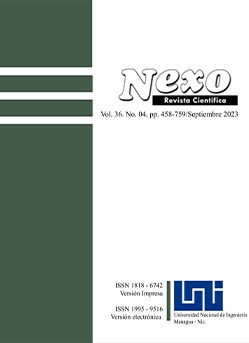A low-cost monocular vision system for robot calibration
DOI:
https://doi.org/10.5377/nexo.v36i04.16752Keywords:
Robot calibration, trajectory tracking, D-H model compensationAbstract
The inverse kinematic model uses robot design parameters: ideal link lengths and mounting angles. In practice, these values hardly coincide with the design values due to manufacturing and assembly processes or continuous use of the robot. In order to reduce this geometric error, it is necessary to calibrate the robot to update the geometric model and reduce the resulting error of the robot end-effector. In this work, we propose a methodology based on a vision system to calibrate the robot's geometric parameters and minimize the error between the robot’s end-effector theoretical and real trajectory. This way, variations are introduced to the geometric parameters that generate errors between the robot's desired position and the position developed. The results show up a reduction of the average position error of 54.6%.
Downloads
1759
Downloads
Published
How to Cite
Issue
Section
License
Copyright (c) 2023 Universidad Nacional de Ingeniería

This work is licensed under a Creative Commons Attribution 4.0 International License.
The authors who publish in Nexo Scientific Journal agree to the following terms:
- Authors retain the copyright and grant the journal the right of the first publication under the license Creative Commons Attribution License, which allows others to share the work with a recognition of the authorship of the work and the initial publication in Nexo Scientific Journal.
- Authors may separately establish additional agreements for the non-exclusive distribution of the version of the work published in the journal (for example, in an institutional repository or a book), with the recognition of the initial publication in Nexo Scientific Journal.
- Authors are allowed and encouraged to disseminate their works electronically (for example, in institutional repositories or in their own website) before and during the submission process, as it can lead to productive exchanges, as well as earlier and greater citation of published works.










